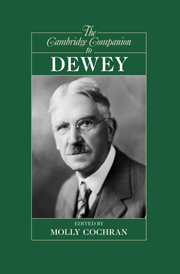Book contents
- Frontmatter
- Introduction
- 1 The making of a democratic philosopher: the intellectual development of John Dewey
- 2 Dewey’s epistemology
- 3 The naturalism of John Dewey
- 4 Dewey’s logic of inquiry
- 5 The primacy of practice in Dewey’s experimental empiricism
- 6 Cognitive science and Dewey’s theory of mind, thought, and language
- 7 John Dewey and action
- 8 Dewey’s moral philosophy
- 9 Ethics as moral inquiry: Dewey and the moral psychology of social reform
- 10 Dewey and pragmatic religious naturalism
- 11 Dewey’s aesthetics
- 12 Dewey’s philosophy of education: a critique from the perspective of care theory
- 13 Dewey’s vision of radical democracy
- 14 Dewey as an international thinker
- Bibliography
- Index
8 - Dewey’s moral philosophy
Published online by Cambridge University Press: 28 September 2010
- Frontmatter
- Introduction
- 1 The making of a democratic philosopher: the intellectual development of John Dewey
- 2 Dewey’s epistemology
- 3 The naturalism of John Dewey
- 4 Dewey’s logic of inquiry
- 5 The primacy of practice in Dewey’s experimental empiricism
- 6 Cognitive science and Dewey’s theory of mind, thought, and language
- 7 John Dewey and action
- 8 Dewey’s moral philosophy
- 9 Ethics as moral inquiry: Dewey and the moral psychology of social reform
- 10 Dewey and pragmatic religious naturalism
- 11 Dewey’s aesthetics
- 12 Dewey’s philosophy of education: a critique from the perspective of care theory
- 13 Dewey’s vision of radical democracy
- 14 Dewey as an international thinker
- Bibliography
- Index
Summary
In his 1930 foreword to Human Nature and Conduct, Dewey wrote: “In the eighteenth century, the word Morals was used in English literature with a meaning of broad sweep. It included all the subjects of distinctly humane import, all of the social disciplines as far as they are intimately connected with the life of man and as they bear upon the interests of humanity . . . Were it not for one consideration [this] volume might be said to be an essay in continuing the tradition of David Hume.” Dewey's contemporaries saw Hume as a skeptic whose moral inquiries were meant to explain away rather than explain our knowledge of moral values and principles. To Dewey, Hume's intent was instead to provide a new and improved grounding for moral knowledge and principles, by demonstrating that moral phenomena are natural phenomena, susceptible to methods of inquiry commensurate with those of the natural sciences. This for Dewey was the “inexpungable element of truth in his teachings.” Dewey, like Hume, was an ethical naturalist who believed that moral phenomena are natural phenomena. But unlike Hume and his twentieth-century successors, such as the emotivists Charles L. Stevenson and A. J. Ayer, Dewey was not a non-cognitivist.
- Type
- Chapter
- Information
- The Cambridge Companion to Dewey , pp. 166 - 186Publisher: Cambridge University PressPrint publication year: 2010
- 6
- Cited by

